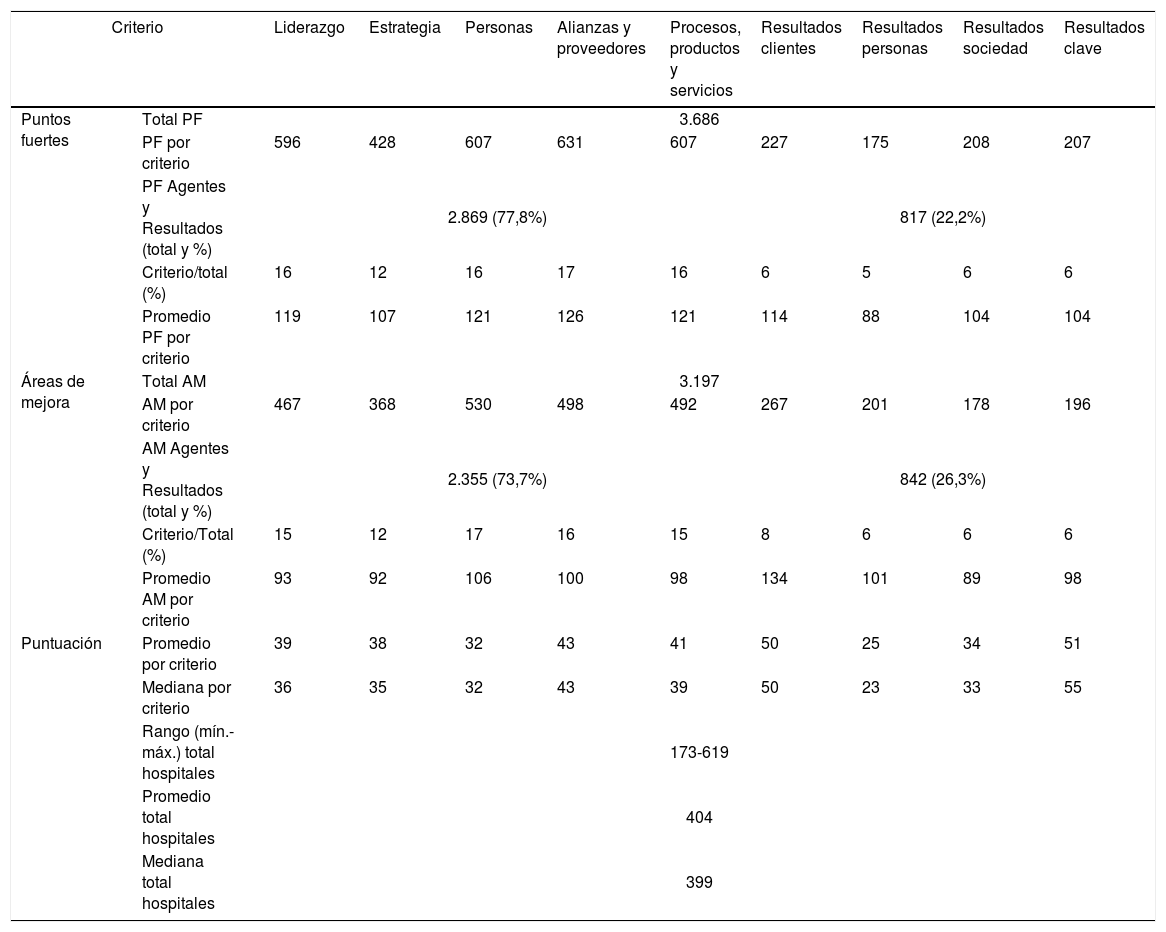Analizar un ciclo completo de autoevaluación con el modelo de excelencia de la Fundación Europea para la Gestión de Calidad (EFQM) en los hospitales del Servicio Madrileño de Salud y su relación con los conceptos fundamentales de excelencia (CFE).
MétodoEstudio descriptivo del total de informes EFQM de los hospitales identificando la metodología utilizada y la información sobre puntos fuertes, áreas de mejora, evidencias relacionadas, matriz REDER (resultados, enfoque, despliegue, evaluación y revisión) y los CFE relacionados en los criterios agentes y en los planes de acción priorizados.
ResultadosLa autoevaluación se realizó en el 85% de los hospitales (29/34) y precisaron formación específica el 86% (25/29) de estos, alcanzando 329h docentes y 833 personas. Se utilizaron grupos de trabajo multidisciplinares en el 83% de los centros (24/29), los cuales sumaron 123 grupos y 857 personas. Se identificó un total de 3.686 puntos fuertes y 3.197 áreas de mejora, siendo respectivamente el 78% (2.869) y el 74% (2.355) en los agentes y el 22% (817) y el 26% (842) en los resultados. La puntuación media fue 404 puntos, con una mediana de 399. Los CFE dominantes fueron la gestión ágil de la organización, el desarrollo de la capacidad de la organización, la orientación a los resultados, la sostenibilidad, la potencialidad de las personas y el valor ofrecido a los clientes, estando el liderazgo y la creatividad e innovación en posiciones inferiores. Se identificaron 113 planes de acción.
ConclusiónSe aporta un ciclo completo de autoevaluación EFQM del sector hospitalario público dependiente de un Servicio de Salud, vinculando el análisis y los planes de acción con los CFE del modelo EFQM.
To analyse a complete cycle of self-assessment using the European Foundation for Quality Management (EFQM) Model in the hospitals of the Madrid Health Service as regards the fundamental concepts of excellence (FCE).
MethodDescriptive study of the EFQM self-assessments of the entire public hospital sector identifying the methodology and the information on strengths, weaknesses, evidence, RADAR matrix (Results, Approach, Deployment, Assessment and Review), and the related FCEs in the enabling criteria and in the prioritised action plans.
ResultsThe self-assessment was carried out in 85% of the hospitals (29/34), 86% of them required specific training (25/29), with a total of 329 teaching hours and 833 people in training. Multidisciplinary working groups were required in 83% of the hospitals (24/29), with 123 groups and 857 people involved. There were 3,686 strengths and 3,197 weaknesses identified: strengths and weaknesses were 78% (2,869) and 74% (2,355), respectively, for the enabling criteria and 22% (817) and 26% (842), respectively, for the results criteria. The mean score was 404 points with a median of 399. The main FCEs were managing with agility, developing organisational capability, sustaining outstanding results, creating a sustainable future, succeeding through the talent of people, and adding value for customers, with harnessing creativity/innovation and leading with vision, inspiration and integrity being placed in lower positions. A total of 113 action plans were identified for all the hospitals.
ConclusionA complete EFQM self-assessment cycle of the entire public hospital sector of a Regional Health Service is provided, linking the analysis and action plans with the FCE of the EFQM Model.








